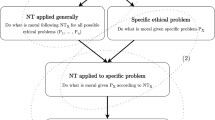Abstract
Non-reductive moral realism is the view that there are moral properties which cannot be reduced to natural properties. If moral properties exist, it is plausible that they strongly supervene on non-moral properties- more specifically, on mental, social, and biological properties. There may also be good reasons for thinking that moral properties are irreducible. However, strong supervenience and irreducibility seem incompatible. Strong supervenience entails that there is an enormous number of modal truths (specifically, truths about exactly which non-moral properties necessitate which moral properties); and all these modal truths must be explained. If these modal truths can all be explained, then it must be a fundamental truth about the essence of each moral property that the moral property is necessarily equivalent to some property that can be specified purely in mental, social and biological terms; and this fundamental truth appears to be a reduction of the moral property in question. The best way to resist this argument is by resorting to the claim that mental and social properties are not, strictly speaking, natural properties, but are instead properties that can only be analysed in partly normative terms. Acceptance of that claim is the price of non-reductive moral realism.
Similar content being viewed by others
REFERENCES
Blackburn, S., Reply: Rule-Following and Moral Realism, in S. Holtzmann and C. Leich (eds.), Wittgenstein: To Follow a Rule. London: Routledge and Kegan Paul, 1981, pp. 163–187.
Blackburn, S., Essays in Quasi-Realism. New York: Oxford University Press, 1993.
Brandom, R. B., Making It Explicit. Cambridge, Mass.: Harvard University Press, 1994.
Davidson, D., Essays on Actions and Events. Oxford: Clarendon Press, 1980.
Davies, M. and Humberstone, I. L., Two Notions of Necessity. Philosophical Studies 38 (1980), pp. 1–30.
Fine, K., Essence and Modality, Philosophical Perspectives 8 (1994), pp. 1–16.
Fine, K., The Logic of Essence. Journal of Philosophical Logic 24 (1995), pp. 241–273.
Gibbard, A., Wise Choices, Apt Feelings. Oxford: larendon Press, 1990.
Griffin, J., Value Judgement: Improving Our Ethical Beliefs. Oxford: Clarendon Press, 1996.
Horgan, T. and Timmons, M., Troubles on Moral Twin Earth: Moral Queerness Revived. Synthese 92 (1992), pp. 221–260.
Hurley, PS. L., Natural Reasons. New York: Oxford University Press, 1989.
Jackson, F., From Metaphysics to Ethics: A Defence of Conceptual Analysis. Oxford: Clarendon Press, 1998.
Kim, J., Supervenience and Mind. Cambridge: Cambridge University Press, 1993.
Johnston, M., Dispositional Theories of Value, Proceedings of the Aristotelian Society Supplementary Volume 63 (1989), pp. 139–174.
McDowell, J., Following a Rule and Ethics, in S. Holtzmann and C. Leich (eds.), Wittgenstein: To Follow a Rule. London: Routledge and Kegan Paul, 1981, pp. 141-162.
Peacocke, C., Metaphysical Necessity: Understanding, Truth and Epistemology. Mind 106 (1997), pp. 521–574.
Wedgwood, R., The Essence of Response-Dependence. European Review of Philosophy 3 (1998), pp. 31–54.
Zangwill, N., Explaining Supervenience: Moral and Mental. Journal of Philosophical Research 22 (1997), pp. 509–518.
Zangwill, N., Direction of Fit and Normative Functionalism. Philosophical Studies 91 (1998), pp. 173–203.
Author information
Authors and Affiliations
Rights and permissions
About this article
Cite this article
Wedgwood, R. The Price of Non-reductive Moral Realism. Ethical Theory and Moral Practice 2, 199–215 (1999). https://doi.org/10.1023/A:1009994827047
Issue Date:
DOI: https://doi.org/10.1023/A:1009994827047



